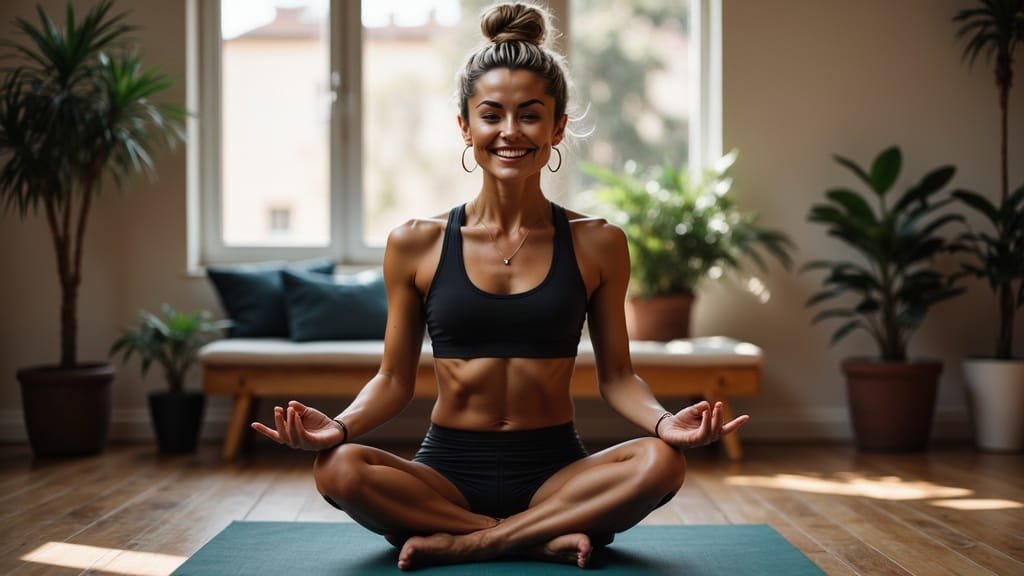Have you ever found yourself tossing and turning in bed? You watch the clock tick away what should be restful hours. We’ve all had those nights where stress and thoughts keep us awake. It’s really frustrating. But, we’re not alone, and there are mindful ways to get our sleep back.
In today’s fast world, mindfulness and sleep are closely linked. Seeking wellness, we turn to mindfulness for better sleep and balance. I’ve faced sleep challenges myself. Mindful breathing and guided meditations at bedtime have greatly improved my sleep.
Many adults, nearly one-third, struggle with chronic insomnia. Stress makes it harder to sleep, kicking our stress response into high gear. Yet, practicing mindfulness meditation at night is proven to help. It can improve our sleep, ease pain, and lessen anxiety.
Let’s start a journey to better sleep and mindfulness together. We’ll look at the science of sleep, how mindfulness helps, and easy tools to use tonight. This guide will help you create a mindful bedtime routine. Our goal is restful sleep for everyone.
Key Takeaways
- Mindfulness meditation significantly improves sleep quality, particularly among older adults.
- Guided meditations and visualization exercises like body scan meditation can reduce anxiety and promote restful sleep.
- Breathing techniques like the 4-7-8 method aid in inducing relaxation and improving sleep quality.
- Incorporating a mindful bedtime routine and maintaining a consistent sleep schedule enhance sleep hygiene.
- Mindful practices are generally safe and provide holistic wellness benefits, but it’s wise to consult a doctor if you have specific health conditions.
Ready to discover how mindfulness can transform your sleep? Let’s dive in.
Understanding the Connection Between Mindfulness and Sleep
We often overlook how mindfulness and sleep quality are linked. Starting a mindful routine helps us sleep better. This happens by reducing stress and improving our relaxation skills. Let’s see how activities like meditation and focused breathing make our sleep better.
The Science of Sleep
Sleep is vital for health, and science supports its benefits. About 30% of Americans don’t get enough sleep. This shows a big need for better sleep solutions. Sleep has different stages, all important for our health. Studies show that mindfulness can change brain activity and help us sleep better. It works as well as some insomnia treatments, giving us a balanced sleep cycle.
The Impact of Stress on Sleep
Stress greatly affects our sleep. Forty-three percent of Americans lose sleep due to stress at least once a month. Long-term stress can raise cortisol levels and mess up our sleep patterns. Women and older adults often have trouble sleeping. Activities like relaxation exercises can help our bodies and minds relax for sleep.
How Mindfulness Can Improve Sleep Quality
Adding mindfulness to bedtime can help us feel calm and ready for sleep. Doing mindfulness regularly lets us focus on now, lowering worry and bringing peace. Techniques like mindful breathing, body scans, and thinking about good things can improve our sleep. Experts say that focusing on positive thoughts can help us drift off to sleep. These methods improve how long we sleep and help tackle insomnia in a big way.
| Stress Factors | Impact on Sleep | Mindfulness Solutions |
|---|---|---|
| Chronic Stress | Increases cortisol, disrupts sleep cycle | Mindful breathing, meditation |
| Screen Time | Blue light interferes with circadian rhythm | Digital detox, guided imagery |
| Bedtime Worry | Anxiety, difficulty falling asleep | Gratitude journaling, positive distractions |
| Inconsistent Routine | Irregular sleep patterns | Consistent mindfulness practice |
The Benefits of Mindfulness for Better Sleep
Many people find it hard to sleep well. At times, up to a third of adults struggle with sleep issues or insomnia. Adding mindfulness to our daily habits can really help us sleep better. It makes us feel better overall. Mindfulness can ease our minds, make us calm, and help us sleep longer and better.
Reducing Anxiety and Promotion of Calmness
Mindfulness is known to lower stress. It teaches us to live in the moment. This helps us forget the worries that stop us from sleeping. It brings a feeling of peace, making sleep come easily. Those who deal with depression or anxiety find mindfulness very helpful.
Enhancing Sleep Duration and Quality
A study in 2019 showed that mindfulness can improve sleep for college students. It lets us handle our thoughts better, quieting the mind. We can fall asleep quicker and sleep deeper. Mindfulness is also good for our body. It can lower blood pressure, ease pain, and improve sleep quality.
- Improved Sleep Efficiency: Mindfulness helps us fall asleep faster, giving us better sleep.
- Deeper Sleep Cycles: It leads to deeper, refreshing sleep cycles.
- Reduced Sleep Disruptions: By calming our minds, it lessens the times we wake up at night, making our sleep better.
Using these sleep tips and practicing mindfulness can give us better sleep. It boosts our mental and physical health.
Practical Mindfulness Techniques for Sleep
Let’s explore ways to make our nights better with sleep mindfulness. These techniques help us relax. They guide us to peaceful sleep.
Breathing Exercises to Induce Relaxation
Breathing exercises are key for a good night’s sleep. They calm our minds and get our bodies ready for sleep. One good method is diaphragmatic breathing:
- Find a comfortable position – Lie on your back, one hand on your chest, the other on your belly.
- Inhale deeply through your nose – Fill your belly with air, watch your lower hand rise, your chest still.
- Exhale slowly through your mouth – Let your belly fall, breathe out tension with each breath.
- Continue this cycle – Try for 5-10 minutes to relax more.
Guided Meditations for Sleep
Guided sleep meditation also helps us relax. It moves our thoughts away from stress. A 2018 study showed it improves sleep.
Try a meditation that uses body scanning and visualization:
- Body Scan – Begin with your toes, move to your head, feel each part. It helps with relaxation.
- Visualization – Imagine a calm place, like a beach or forest. Feel its peace. It helps you sleep.
Studies, including one from 2014 on insomnia, show these techniques really help. They lead to better sleep if we do them regularly.
| Technique | Benefits |
|---|---|
| Breathing Exercises | They lower heart rate, calm us down, and reduce anxiety. |
| Guided Sleep Meditation | They boost melatonin and serotonin, making it easier to sleep. |
Creating a Mindful Bedtime Routine
Developing mindful sleep habits is key for good rest. A routine at bedtime can help. It tells your brain that it’s time to rest. This makes sleep come easier.
Setting a Consistent Sleep Schedule
Sticking to a sleep schedule is important. Go to bed and wake up at the same time every day. This trains your body to know when to relax. Before bed, try reading or journaling. It helps calm your mind.
- Turn off screens at least two hours before bed.
- Read a calming book with uneventful plot lines.
- Mimic a nighttime drop in body temperature with a warm bath.
- Engage in sleep meditation techniques such as deep breathing.
Unplugging Before Bed: Digital Detox
Unplugging from devices helps you sleep better. The blue light from screens can mess with sleep. A digital detox helps you wind down.
- Turn off computers, tablets, and smartphones at least two hours before bedtime.
- Use an aromatherapy diffuser with essential oils like lavender to relax.
- Listen to calming music or white noise to create a peaceful atmosphere.
- Spend 10-15 minutes on mindfulness meditation or deep breathing exercises.

| Activity | Benefit |
|---|---|
| Reading | Promotes healthy sleep patterns and mental relaxation |
| Warm Bath | Triggers a sleepy reaction by mimicking body temperature drop |
| Journaling | Helps declutter thoughts and process emotions |
| Listening to Calming Music | Reduces anxiety and creates a peaceful environment |
Adding these steps to your night can make sleep much better. It leads to a healthier life. Let’s make each night restful with mindful steps and sleep meditation techniques.
Mindfulness Practices for Daytime Awareness
Doing mindfulness practices during the day can make our sleep better. By being aware of what is around us and our feelings, we relax more. Such relaxation helps us sleep better at night. Let’s look at two good mindfulness exercises: being mindful during the day and writing in a journal.
Mindful Awareness During Daily Activities
Simple tasks can become chances for relaxation and mindfulness. Enjoying your morning coffee or a walk in the park are great times to practice this. By focusing on the moment, we feel less stressed and think clearer. This also helps us sleep better.
Studies say mindfulness meditation helps with sleep problems. Adding mindfulness to our day reduces our heart rate and cortisol. This makes our body ready for good sleep.
Journaling to Process Thoughts and Emotions
Writing in a journal is another great way to improve mindfulness and sleep. Writing down our thoughts and feelings helps deal with stress and anxiety. This habit lets us reflect, recognize our emotions, and let go of worries.
Research shows that journaling helps us find what makes us stressed and how to handle it. Along with mindfulness, it lessens anxiety at night. This leads to better sleep habits.
Using these mindfulness activities helps us prepare for sleep. Being present and dealing with our feelings through mindfulness and writing helps. We go to bed with a calm and clear mind, ready for restful sleep.
The Role of Environment in Mindful Sleep
Good sleep is not just about the mind. It’s also about where you sleep. Making our spaces better can help us sleep deeply. This leads to a more refreshing night’s sleep.
Creating a Calming Sleep Space
Your bedroom should be peaceful. It’s important to keep it cool, between 60-67 degrees. Cooler places help us sleep better. Cutting down on noise and light is also key. Blackout curtains and white noise machines are great for this.
Too much mess can keep you awake. A clean room helps clear your mind. This makes bedtime calm easier. Using smells like lavender can also make your room more relaxing. They help improve sleep.
The Importance of Comfort and Accessibility
Being comfortable is key for good sleep. The right mattress and pillows are a must. They should suit how you sleep. Also, breathable bedding is good for keeping a nice temperature.
Keep things you need at night close by. This means having water and an eye mask near your bed. Make sure your room is airy too. This helps you keep a good sleep routine. If you still find sleeping hard, it might be time to get some help.
A nice sleep space does a lot for rest. It makes us feel calm and comfy. Start making these changes tonight to sleep better. To learn more about sleep and mindfulness, click here.
Mindfulness Apps and Resources for Sleep Support
Trying to sleep better? Mindfulness apps can help. They have lots of sleep tips and practices for calming the mind. These tools can get your body ready for sleep. Let’s check out some top choices and other helpful things for sleep.
Popular Mindfulness and Meditation Apps
Mindfulness apps are easy to use and offer many sleep and mindfulness practices. Headspace is a big name in this. It costs about $70 a year. Beginners to experts can find something useful here, with activities grouped into Meditation, Sleep, Movement, and Music.
In 2018, Wirecutter looked at 19 apps and liked what they saw. Headspace has over 500 meditations and many activities for stress relief, even for kids. Prices for these apps range from $10 to $100 a year. They’re a big help for feeling better all around.
Books and Online Courses
There are also many books and online courses on mindfulness and sleep. The Book of Sleep by Dr. Nicole Moshfegh is one. It uses science and mindfulness to help you sleep better. Sites like Coursera and Udemy have many courses too. They cover everything from sleep basics to deep mindfulness skills.
Using these mindfulness tools every day can help reduce stress and improve sleep. We have access to lots of guided practices and expert advice. This can lead to happier days and restful nights.
Overcoming Common Sleep Challenges with Mindfulness
Using mindfulness can make our sleep better. Let’s see how sleep mindfulness exercises can fight insomnia and reduce night worry.
Managing Insomnia through Mindfulness Techniques
Insomnia can be tough. But, adding mindfulness to our bedtime routine can change things. Studies show guided meditations help us relax and stress less. Yoga nidra and tai chi also help by calming our minds and bodies.
Here’s a table that shows how mindfulness can help with insomnia:
| Mindfulness Technique | Effectiveness on Sleep |
|---|---|
| Guided Meditation | Improved sleep quality |
| Yoga Nidra | Reduced time spent awake in bed |
| Tai Chi | Enhanced relaxation and sleep duration |
Using these methods, our sleep space can become more peaceful.
Coping Strategies for Nighttime Anxiety
Nighttime anxiety can make sleep hard. We can fight it by using coping strategies for anxiety at bedtime. Try easy breathing or muscle relaxation to relax. Mindful journaling before bed can also help by letting us sort out our thoughts.

Mindfulness changes how we sleep, making our rest deeper. Research says mindfulness meditation can boost sleep quality. It works as well as exercise or therapy. Adding these habits to our bedtime routine can help with mental and physical anxiety. This means a smoother shift to sleep.
Let’s keep trying these mindfulness and coping tips. They could really change how we sleep and feel overall.
Incorporating Yoga and Stretching into Your Routine
Adding yoga and stretching to your nighttime routine is great for mindfulness and sleep. These practices help us relax and stress less before bed. This can make falling asleep easier.
Simple Bedtime Yoga Poses for Relaxation
Doing yoga before bed helps our bodies and minds calm down. Here are some poses that work well:
- Legs-up-the-Wall Pose: This pose is super for relaxation and should be held for up to 5 minutes. It’s very calming, especially after a busy day. Engaging in such poses can enhance mindfulness for better sleep.
- Reclined Butterfly Pose: Staying in this pose for a few minutes can loosen the hips. It helps ease the body into a relaxed state, perfect for good sleep.
- Corpse Pose (Savasana): Holding this pose for about 15 minutes promotes full relaxation. It’s the best way to end a yoga session that aims to improve sleep.
The Benefits of Stretching on Sleep Quality
Stretching before bed can really help improve your sleep. It does so by reducing physical discomfort and making you relax. Here are some key benefits:
| Benefit | Impact |
|---|---|
| Reduced Muscle Tension | Stretches for the neck, shoulders, and back ease day-long strain and tension. |
| Lower Cortisol Levels | Yoga and stretching both lower cortisol, which helps us relax and feel calm. |
| Improved Sleep Quality | Doing these activities regularly can help us fall asleep quicker and sleep deeper. |
| Better Posture | Stretching helps fix bad posture, reducing sleep-disrupting discomfort. |
Using these relaxation methods nightly can greatly improve your sleep. Whether you choose yoga or stretching, taking time to relax can lead to restful sleep.
Building a Sustainable Mindfulness Practice
Starting a steady mindfulness habit is key to its full benefits. It’s vital to aim for realistic goals and keep a regular routine. This helps us get the most out of mindfulness.
Setting Realistic Goals for Mindfulness
Creating doable goals is essential for lasting mindfulness. It means blending mindfulness into our lives without feeling stressed. Begin with easy steps like five minutes of mindful breathing or quick body scans. Over time, we can do more or try new methods. This slow build-up keeps us motivated and keeps our practice going.
Tips for Maintaining Consistency
Staying regular with mindfulness is crucial for it to work long term. Here’s how to keep it up:
- Routine Planning: It’s a good idea to schedule your mindfulness like you would for bedtime, starting an hour before you sleep.
- Environment: Make your space right for mindfulness. Studies show sleeping is best at 65 to 68 degrees Fahrenheit. This also helps make meditation comfy.
- Digital Detox: Shut off screens 30 minutes before sleep to cut down on distractions and relax more.
- Accountability: Find a mindfulness friend or group for support and to grow together.
- Flexibility: Be open to change. If one way isn’t helping, try a different method. Switching things up keeps it interesting and works better.
To keep a mindfulness habit that grows and helps us more, try these ideas. For extra tips on mindful sleep practices, check out our resources.
Transitioning to Mindful Sleep Practices
Moving towards mindful sleep habits takes time and focus. We can get better sleep and feel better by using sleep meditations. It’s key to see how you’re doing and tweak your mindfulness as needed.
Tracking Your Sleep and Progress
It’s key to watch how you sleep to see what helps. You can use a sleep journal or apps to keep track. You might find that things like breathing deeply or body scans work well for you.
Adjusting Your Mindfulness Techniques Over Time
As we keep learning, changing how we practice mindfulness is important. Mixing things like listening exercises or using apps like Synctuition keeps it interesting. Adding yoga or stretching at night might also help, as many who do yoga sleep better. By doing this, our sleep meditation practices stay helpful in our search for good sleep.



